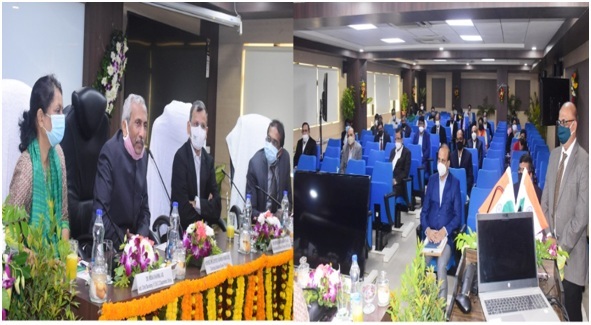Bhubaneswar: Chairman National Green Tribunal Justice Adarsh Kumar Goel had an interactive session with State Government officers led by Chief Secretary Suresh Chandra Mahapatra in conference hall of the Odisha State Pollution Control Board (OSPCB) today, wherein Member Secretary Dr K. Murugesan presented the current pollution scenario in the State along with the measures taken to control and mitigate the impact of the pollution generated from different sources. Principal Secretary Housing and Urban Development G.Mathivathanan also appraised about the management of different types of wastes in urban local bodies.
While complimenting the State for its accomplishments in management of the pollution as “remarkable achievements”, Justice Goel advised to continue the efforts. He appreciated the performances of Odisha in monitoring of industrial affluents, and urban wastes. He said, “The issue of environment is very complex; and, it has direct bearing on health and life of the present as well as future generation”. Mentioning about different Acts, Rules, stipulations of Indian Penal Code, and Criminal Procedure Code; he said that legal provisions and enforcing authorities had been put in place. Continued efforts for their enforcement throughout the country would curtail devastating effects of the pollution.
Chief Secretary Suresh Mahapatra said, “State is taking all possible measures for complying to the environmental norms; and, the Government under the leadership of Chief MinisterShri Naveen Patnaik is constantly taking direct feedback of the people through the innovative approach of Mo Sarkar”.
Discussions in the meeting showed that in recent years OSPCB expanded its activities both in terms of quality and quantum through 14 regional offices, 11 regional laboratories and one central laboratory for enforcement and compliance. The board has also set up a center at Paradeep for management of coastal eco-system. The board is constantly monitoring the water quality of 11 major river basins in 129 locations with respect to 36 parameters; ambient air quality of 17 major towns with 11 CAAQMS stations, biological health of 08 major river systems with 29 stations, ground water quality in 30 districts with 91 monitoring stations, and coastal environment monitoring at 73 locations from Paradeep to Dhamara.
Member Secretary Dr Murugesan appraised that the board set up a state of the art central monitoring unit through online systems and softwares. In total 316 CAAQMS, 642 CEMS, 90 CEQMS were installed and connected with the central server of the Board. Through these, the Board does the real time monitoring of the air, water, industrial, solid waste and bio-medical wastes.
He also said that that fly ash, gypsum, red mud, dolochar and slag were the major industrial waste generated in the State. In the year 2020-21 around 91% of the fly ash and 90% of the other hazardous waste were processed and reutilized.
The Board has also rolled out online service delivery of 6 important services i.e. consent to establish, consent to operate, authorization under hazardous waste management, biomedical waste management and e-waste management and registration under plastic waste management with decided timelines and payment gateway for approvals. Because of its transformative measures, OSPCB has been ranked as NO-1 in transparency index conducted by the Center for Science and Environment.
Principal Secretary Housing and Urban Development G. Mathivathanan appraised that the State devised and applied innovative models for management of solid waste, faecal waste, plastic waste, e-waste, and grey water in the urban bodies. At present around 2105 ton of solid waste per day is being generated from the urban bodies. Those are being processed through 232 micro composting centers (MCCs), and 154 material recovery facilities (MRFs). The technique of Mo Khata has earned success for the MCCs. Around 1203 MT of Mo Khata has been generated from these wastes with total sale proceed of Rs.2.45 cr. Around 2043 Swachha Sathis, and 1831 Swachha Karmies from among the women self help groups, rag pickers and trans-genders have been trained and engaged in these operations. Now this model is being extended to rural areas through rural-urban convergence.
Additional Chief Secretary Forest and Environment Dr Mona Sharma along with senior officers and Scientists of the State Pollution Control Board participated in the discussions. Chairman Justice Goel also clarified the queries of some senior enforcing officers. After the meeting Justice Goel visited the central monitoring unit to observe the functioning of the real time monitoring of the pollution level.


Comments are closed.